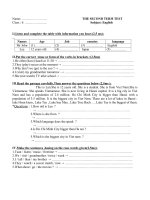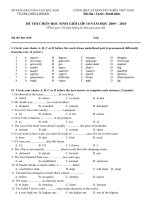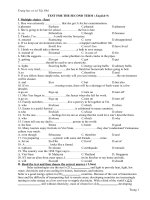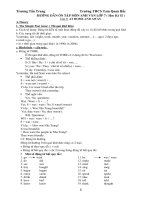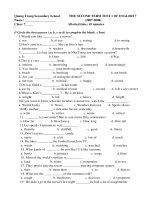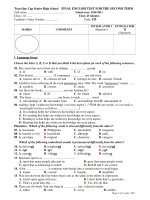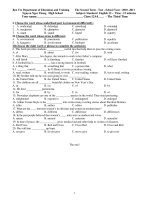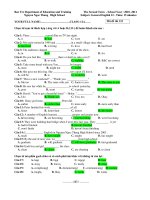Languange Focus- The Second Term
Bạn đang xem bản rút gọn của tài liệu. Xem và tải ngay bản đầy đủ của tài liệu tại đây (56.39 KB, 5 trang )
LANGUAGE FOCUS THE FIRST TERM GRADE 8–
I. Choose the word with the different pronunciation
1. a. hold b. favor c. over d. enroll
2. a. lunar b. hut c. under d. upset
3. a. guide b. build c. community d. student
4. a. fund b. sure c. much d. such
5. a. scout b. shout c. outdoor d. youth
6. a. flowers b. leaves c. plants d. trees
7. a. planned b. planted c. registered d. raised
8. a. ancient b. special c. delicious d. participate
9. a. tidy b. written c. prize d. final
10. a. correct b. contest c. century d. custom
II. Odd one out
1. She told me you that present. (giving / to give / gave / given)
2. Jane is beautiful than her sister. (as / like / the most / more)
3. London is capital city in Europe. (large / larger / most large / the largest)
4. When I was a little girl, I used to my father’s advice. (listen / listen to / listening /
listened)
5. Do you need any help?
(No, I don’t need / Thanks, I don’t need / Yes, that’s very kind of you / Yes, I need)
6. Do you know that began in England in 1907? (scout / scouter / scouting /
scouted)
7. I don’t know how this game. (play / played / to play / playing)
8. I take part most of the youth activities of my school. (on / in / to / for)
9. We’re looking forward to you earlier. (see / seeing / saw / be seeing)
10.I Cuba in 1990. (visit / visited / have visited / was visiting)
11 you ever to America yet?
(Have been / Were being / Were been / Are been)
12. Finally, we decided to the cinema. A. going B. go C. to go D. gone
13. Thank you inviting me to the rice-cooking festival. (for / at / to / of)
14. Ba his homework.
(finished already / already finished / have already finished / has already finished)
15. I think playing in the rain is (danger / endanger / dangerous / dangerously)
16. Where is Mai? - She’s out. She said she back soon. (shall / would be / was / is)
17. What time ? About an hour ago.
(he phones / he phoned / did he phone / has he phoned)
18. My Dad for this company since 2001.
(work / works / worked / has worked)
19. Kate hates to classical music. (listens / listened / listen / listening)
III. Give the correct verb form:
1. My brother usually (go) to work eary to avoid traffic jams.
2. They (move) to Ho Chi Minh City in 1990 and (live) there since then.
3. Helen (feel) very well yesterday but today she (feel) sick again.
4. What are you doing to night ? – I (go) the circus.
5. Do you ever go (swim) in the sea?
6. They suggested (have) dinner in an India restaurant.
7. Would you like (go) out for a drink with me?
8. Would you mind (close) the window?
9. Lan wants (become) a teacher.
10. I didn’t feel like (go) out last night, so I stayed at home.
11. This film is the best one I ever (see)
12. She always (remember) the names of the people that she meets.
13. What you (do) now? – I (learn) English.
14. I (not see) him since he (leave) this school.
15. I usually read the newspaper while I (wait) for the bus.
IV. Make the question for the underlined words:
1. They have just bought some musical intstruments.
1. The boys are going to the
circus.
2. The children went to the zoo by
bus.
3. I often go out for a walk after
dinner.
4. The match started at 7
o’clock.
5. The student studies in the
library.
6. My brother has learned English for 3
years.
7. He is working in the garden now.
8. Marie Curie was born in
Poland.
9. Yes , he plays soccer in his free
time.
10. They plant and water trees along the streets on weekend.
11. They help the community by participating in recycling program.
V. Write the full sentences:
1. His father/ fly/ Hanoi/
tomorrow.
2. Lan/ study/ Ngo Quyen School/ two
years.
3. She/ often/ walk/
school.
4. The circus/ come/ town/ this
weekend.
5. Tim/ should/ work harder/ his
Spanish.
6. My mother/ tell/ me/ do the house
work.
7. They/ advise/ her/ not eat fatty
food.
8. My brother/ just/ go out/ for a
walk.
9. You/ hear/ about her/
recently?
10. What / your father / do / at the moment? – He / listen / music.
11. Your brother/ often/ play/ tennis/ after school? - No/ He/ read books/ or/ watch
TV.
12. He/ ask/ his students/ keep quite.
VI. Give the correct form of words.
1. She makes no (differ) between her two sons.
2. He is always (care) He may fail his driving test.
3. My brother is (interest) in football.
4. I don’t like his (choose) of friends.
5. How (enjoy) the book is! I really can’t put it down.
6. Can I be of any (assist)
7. My grandfather was a good tennis player in his (young)
8. We are working for a voluntary (organize)
9. Our country is rich in (nature) resources.
10. She actively (participation) in social work.
VII. Fill the blanks with the suitable preposition:
1. I’m interested farming.
2. My grandmother prefers living in the countryside living in the city.
3. He got used the noise.
4. My parents are tired living in the city.
5. She’ll looking a job.
6. They are very proud their new house.
7. Tim should work harder his Spanish pronunciation.
8. Try to learn the meaning of new words heart.
9. Please fill this form.
10. My sister is not very good Math.
VIII. Find out and correct the mistakes:
1. Why does your father dislike to drive the car?
2. I’m glad telling you that I’m going to have interesting activities.
3. All you have to do is collect glass, paper and cans and send it for recycling.
4. She said, “Ring my boss and tell him I wouldn’t be back tomorrow”.
5. The teacher ordered we not to open our books until she told us to do so.
6. She is a famous singer. She sings beautiful.
7. Lan lived in America for six years, so she speaks very well English.
8. Ken grew up in a small town and isn’t used to live in a big city.
9. He told me come home early.
10. My friends advised me going to the hospital.
11. He was ill since last week.
12. The children enjoyed to watch the performing lions.
IX. Complete the passage:
often flowers fresh for
water
carpet peaceful from path
however
My village si about 50 kilometers (1) the Capital. It is a very beautiful
and (2) place where people grow (3) and vegetables only. It’s very famous
(4) its pretty roses and pictureous scense. The air is quite fresh, (5), the
smell of the roses makes people feel cool. In spring, my village looks like a (6)
with plenty of colors. Tourists come to visit it so (7). Nowadays, with electricity,
it doesn’t take the villagers much time to (8) the roses. And even at night, people
can walk along the (9) and enjoys the (10) smell of the flowers.
X. Rewrite the sentences:
1. My mother is very tired, so she can’t cook dinner. (too)
2. I moved to this city ten years ago. (I have )
3. “Is Phong Nha Cave far from Ha Noi, Lan?” Peter asked.
4. “I want my room to look like nice at this festival?” Hao said.
5. “What are you studying, Lan?” I said.
6. I last saw her in February. (I haven’t )
7. Minh began to collect stamps in 2000. (Minh has )
8. The weather wasn’t warm. We couldn’t go swimming. (enough)
9. I am very short. I can’t reach the picture on the wall. (too)
10. “Can you open the door, Ba?” asked the teacher. (The teacher asked Ba )
11. Miss Lan wants to be a teacher. She loves children. (because)
12. Ho Chi Minh City is the biggest city in Vietnam. (No city )
XI. Read the text then do the exercise below:
More and more people from the countryside are moving to the city with the hope
that they can have a better life. They want to improve their living conditions and quality
of life. They think that weel – paid jobs are always available there. In fact, lifelife in
the city is hard strugge to earn a living. Finding a job is quite a problem and they have
to work hard from morning till night.
The city doesn’t offer as many opportunities as they expect, but they do not want to
turn to the countryside where natural disasters such as typhoons, floods, droughts can
take their harvests away ang live them with little or even nothing. This has led to many
problems that governments all over the world are trying to solve: shortage of water and
electricity sipplies, overcrowded hospital and schools, housing conditions and so on.
1. Answer the questions:
a. Many people from the countryside want to improve their living conditions and
quality of like. What do they do?
b. Are well-paid jobs always available in the city? Which sentences tells you this?
c. Why do they not want to return to the countryside?
d. What problems are governments all over the world trying to solve?
2. Fill each gap with a words?
a. In the countryside, life is always a with nature.
b. It is to find a job in the city.
c. There are not as jobs as they drink.
d. make their crops fail because of lack of water.
e. There are too many people moving to the city. They need places to live in, so
becomes a big problem.
